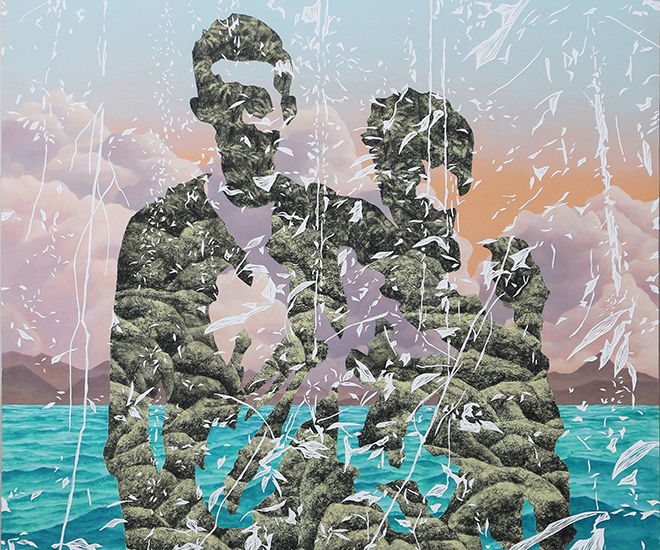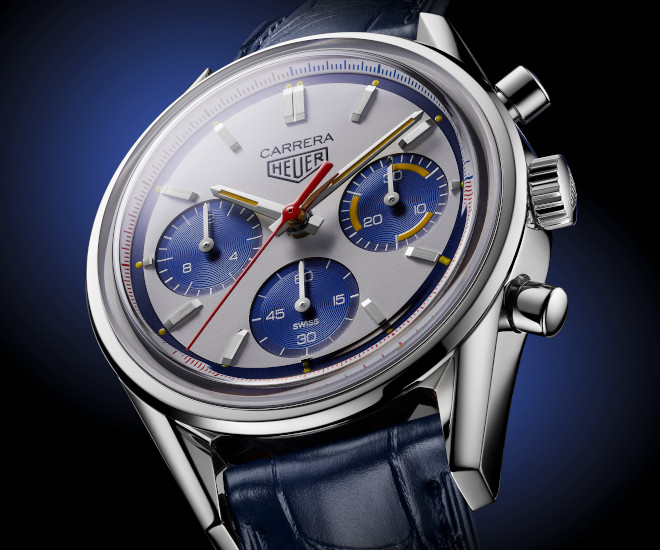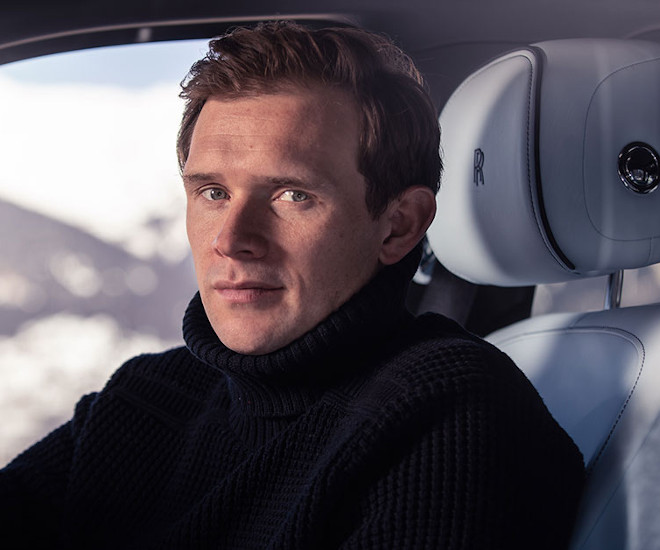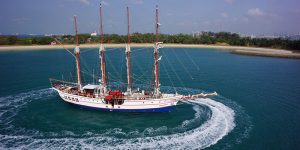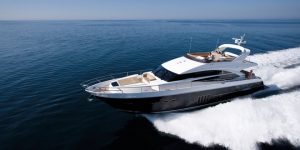Fountaine Pajot’s New MY40 Powercat Shines in Singapore
Fountaine Pajot’s new MY40 shone on her Asia premiere in Singapore, the powercat showing speed, stability, fuel economy and impressive living spaces.
The year 2019 could prove pivotal for Fountaine Pajot in Asia, with the French builder bringing out the brand-new MY40 and flagship Alegria 67 for their Asia premieres in Singapore in April, while adding Indonesia’s Yacht Sourcing to their network of dealers in the region.

The Asia premiere of Fountaine Pajot’s new MY40 was held in Singapore
In Phuket in January, the Alegria 67 started the year by winning Best Multihull Sailing Yacht in Asia (over 15m) at the Christofle Yacht Style Awards, while in late April that accolade was backed up with the Multihull of the Year (Over 50ft) honour at the International Multihull Boat Show at La Grande Motte in southwest France.
Fountaine Pajot has been building motor yachts since the late 1990s, having previously focused on racing then cruising sailing catamarans a few years after the shipyard was founded in La Rochelle in 1976. In recent years, it has carved out a new era of powercats, starting in 2015 with the launch of the MY37, currently the smallest model in its range.
Fountaine Pajot’s motor yacht range moved to a new level of acclaim following the world premiere of the MY44 at Boot Dusseldorf in early 2017, the model collecting awards around the globe including 2018 European Power Boat of the Year.
In Dusseldorf this January, the builder plugged the gap between its existing models with the MY40, which has built on the outstanding layout and performance of its big sister by retaining the services of veteran French naval architect Daniel Andrieu and Italian interior architect Pierangelo Andreani.

The MY40 makes herself at home in Singapore waters
Andrieu, 72, has stated that chief priorities were reconciling speed, low fuel consumption and outstanding stability, and these have been achieved with a hull design fine-tuned from the two previous models and the use of the IPS system, also used on the MY44.
The MY40 has 300hp IPS 400 drives as standard, with the 370hp IPS 500 as an option. The joystick simplifies docking and other manoeuvres, and with the engines well separated, no bow thruster is needed. Manoeuvrability? Tick.
Developed by Volvo, the IPS system is also very quiet, free of vibrations and uses less room, freeing up more space in the hulls for the cabins.
Fuel consumption is remarkably low, down to 1 litre/nm, according to Fountaine Pajot. Even at full speed, it consumes about 1 gallon/nm, whereas a typical 50ft monohull would consume double this at 20 knots.

The saloon and aft galley combine well with the cockpit when the aft doors slide behind the flybridge staircase
“The MY40 has all the benefits of twin hulls, so it has low consumption, high stability and a top speed over 20 knots,” said Romain Motteau, Deputy CEO of Fountaine Pajot, who admitted other key aims for the model were an owner’s suite worthy of monohull.
THE GREAT INDOORS
Power and performance aside, the yacht’s layout is arguably its winning asset, with the portside owner’s suite and the enormous flybridge two highlights of Andreani’s work.
The surprises start in the asymmetrical cockpit (12.5sqm), which instead of the straight sofa used on the 37 and 44, has an L-shaped version, which creates a more social area and works better with the optional table. Three hatches in the cockpit floor offer key access points to the engines and other hardware, but do make it all a bit bumpy underfoot.
The large saloon doors slide neatly behind the curving portside staircase. However, a tall tap and a double sink dominate the starboard counter between the cockpit and C-shaped galley, a bit of a mood killer for what could be a fun bar or prep area. To port is a huge fridge-freezer.

The beautifully designed saloon benefits from large windows on all three sides and has plenty of seating and cabinet space
Forward of the galley is a beautifully designed saloon of a size that “compares to a 50ft monohull”, according to Motteau. Completely open to the cockpit and with huge windows forward and round the sides, the saloon enjoys fantastic light and views.
Furniture wise, it’s dominated by a big, comfortable sofa along the port side, with facing chairs at either end. The long, thin table slats have the option of electrically rotating and folding open to create a large dining table, while to starboard a pop-up TV rises aft of the bench-seat helm station when guests are ready for an evening movie.
Portside stairs lead to the guest quarters, or firstly a small hall that accesses the shared bathroom and shower, and communal cupboards. There’s a double cabin aft, while the forward room can be either another double or twin bunks, the latter enjoying good floor and bench space. Both guest cabins enjoy light from good-sized hull windows and have their own cupboards.

The owner’s suite is a standout feature on the MY40
The much talked-about owner’s suite is accessed by stairs in the other corner of the saloon, aft of the fridge, and again lead to a small hall, this time with space for an optional washing machine.
Reputed to be the largest owner’s suite in its class, the 12sqm master is a remarkable achievement and benefits from fantastic headroom. A double bed faces the long hull window and porthole, and is flanked on either side by both seating and, another foot up, large side tables and lamps. Forward are open drawers by the bed and a small desk or vanity table by the window.
Forward is a long en-suite bathroom, which is decorated more like a walk-in wardrobe and has a beautifully appointed sink and cabinets with further storage, as well as a huge frosted-glass shower stall that makes the most of another hull window, and the enclosed head.
FAB FLYBRIDGE AND FOREDECK
Arguably the most exciting communal area is what Motteau describes as a “super large flybridge”, which at 17sqm has also been described as biggest in its class. It’s well protected on this model by a hardtop with sunroof, crucial in Singapore or other tropical areas.

The double sunpad on the flybridge is perfect for a snooze
The elegant curved staircase brings you to a portside wet bar with fridge and optional barbecue, plus a large double sunpad that can lie flat or have an angled backrest. It’s arguably the best lounging space on the yacht, offering great panoramic views while being protected from above.
Starboard is the helm station, which can have one or two seats, while aft is the main social area, a large three-sided arrangement of seats with either a coffee table or larger dining table. Again, the area is well sheltered yet open to great views and welcome breezes.
The foredeck offers a more intimate exterior area, an 8sqm sunken cockpit flanked by forward-facing sunpads with adjustable backrests. It’s ideal for two people to sunbathe or read in peace, or for three of four to share conversation and cocktails.

The sunken foredeck is popular for both lounging and socialising
At the other end of the boat, Fountaine Pajot offer an optional aft swim platform that can be lowered and which seems worthwhile for those planning to cruise in warm waters.
Fountaine Pajot is enjoying a strong run on both the sail and motor side, while commercially it flexed its muscles last year with the acquisition of its neighbour Dufour, traditionally a builder of sailing monohulls but which has recently launched its first sailing catamaran.
With sailing cat leader Lagoon still only producing powercats above 60ft, Fountaine Pajot has put itself in a strong position in the motor yacht sector with a strong set from 37-44ft, with Leopard from South Africa and Aquila from China among the few producing similar models for a global audience.

The aft platform is optional but ideal for tropical waters
However, Fountaine Pajot doesn’t see such companies as its most obvious competition and is more interested in offering a more spacious and economic option for owners who would otherwise buy premium motoryachts from the likes of Prestige.
And bearing in mind that the La Rochelle builder is preparing to launch a Power 67 in 2020, power catamarans could increasingly prove a market disruptor, much like their sailing sisters.
The original article appears in Yacht Style Issue 47. Email [email protected] for print subscription enquiries or subscribe to the Magzter version at: www.magzter.com/SG/Lux-Inc-Media/Yacht-Style/Fashion/
Yacht Style #47: The Multihulls Issue – Today’s Choices, Sail to Power

